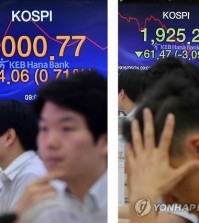- California Assembly OKs highest minimum wage in nation
- S. Korea unveils first graphic cigarette warnings
- US joins with South Korea, Japan in bid to deter North Korea
- LPGA golfer Chun In-gee finally back in action
- S. Korea won’t be top seed in final World Cup qualification round
- US men’s soccer misses 2nd straight Olympics
- US back on track in qualifying with 4-0 win over Guatemala
- High-intensity workout injuries spawn cottage industry
- CDC expands range of Zika mosquitoes into parts of Northeast
- Who knew? ‘The Walking Dead’ is helping families connect
‘I.Seoul.You’ is new slogan for Seoul
“I.Seoul.You” has been selected as the capital city’s new slogan.
The Seoul Metropolitan Government announced Wednesday that “I.Seoul.You” beat the two other candidates ― “Seoulmate” and “SEOULing” ― to replace its current slogan “Hi Seoul.”
“Seoulmate” won slightly more votes than “I.Seoul.You” in an online poll. However, in an on-the-spot poll held in the evening at Seoul Plaza, all nine experts and 682 out of a total 1,140 citizens voted for “I.Seoul.You,” which beat “Seoulmate” with only 232 votes.
Lee Ha-rin, a Korean student who studies philosophy in college, is the winner of the slogan contest, in which more than 16,000 people participated.
Prof. Kim Yoo-kyung of Hankuk University of Foreign Studies, marketing company Playground CEO Kim Hong-tak and Prof. Seo Kyung-duk of Sungshin Women’s University were among the experts.
“It was very meaningful that Seoul citizens participated in the whole process from making to selecting the new slogan,” Seo said.
Kim Min-ki, who was in charge of the project, said that the new slogan will be used to rebrand the city globally.
Yet, many PR experts and expats expressed concern that the new slogan will likely attract international ridicule, saying that “I.Seoul.You” is not just uninspiring but also makes little sense in English.
They criticized the other two finalists as well, saying that the municipality overemphasized the domestic aspect in selecting the English slogan with a panel of experts that had only one native English speaker on it.

















